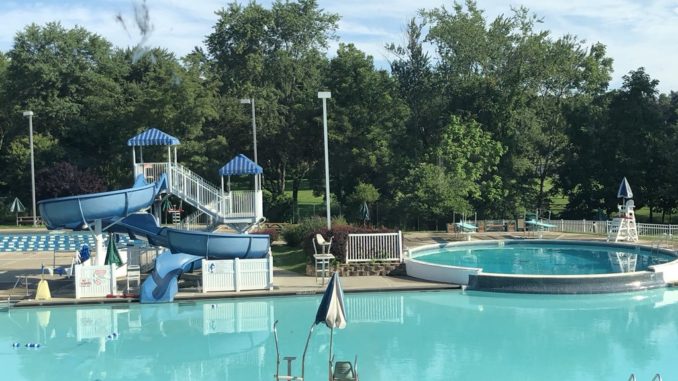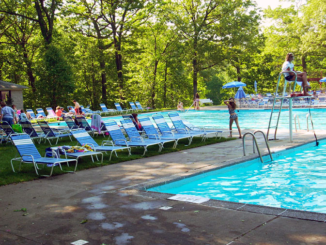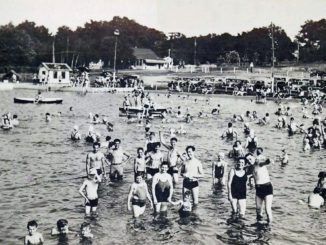
BERGEN COUNTY, N.J.—After nearly closing in 2018 due to shrinking memberships, Harrington Park Swim Club remains afloat in 2019—hoping to increase memberships—while most longtime northern Bergen County swim clubs appear to be for now doing swimmingly, say local pool managers.
Last year, Bergen County almost lost their third swim club in under five years as Harrington Park’s nearly 60-year-old facility staved off closure by appealing to residents and families. Only a late spring membership campaign saved the club from shutting its doors.
In the last few years, Montvale’s municipal pool and Tenafly Swim Club have gone under due to declining memberships and increased costs.
About eight years ago, Closter Swim Club was closed due to toxic contaminants found in soil there and declining annual enrollment, said Mayor John Glidden recently. At a public forum Aug. 5 in Closter, some residents expressed hope that the shuttered club can be reopened but the issue of remediating toxic soil must first be resolved.
Success at Stonybrook
One example of success is Hilldale’s Stonybrook Swim Club, a 12-acre property with a total of five different pools including a diving pool, a 14-foot slide for kids, and a heated competition pool, plus pools with varying activities for all ages, said Patty Hughes, pool manager for 22 years.
The club offers learn-to-swim programs and club members receive a lot more: a basketball court, playgrounds, ping-pong tables, plus theme nights, movie nights, and “live” bands and music. In addition. The pool offers two camps for kids and six levels of swimming programs and memberships have been increasing, said Hughes.
Stonybrook is open to non-residents, who pay slightly higher fees. A resident family of up to five members pays $630 to join by May 5 while a non-resident family pays $901.
Hughes said the pool also features a full-service snack bar, two gazebos and a pavilion for shade, hot showers, changing areas, stainless steel and tiled bathrooms and a variety of daily kids’ activities, including sports, crafts and board games.
She attributed its success to “constantly reinvesting” in the swim club, including annual maintenance, renovations and upgrades.
‘Always upgrading’
“We are always upgrading and we don’t wait until we have to,” she said, citing water slides, water sprays and their heated pools as enhancements which make the club more appealing to residents.
“[You] have to keep investing in clubs and keeping up with the times. People are looking for more than a place to cool off so we have to be more than a swim club. You have to keep adding things and make it attractive for people to come,” she said.
Asked why the club, begun originally in 1940, is successful, Hughes said “because we’re always looking to see what we can do to serve [members] better.”
She said next year the club will be adding lounge chairs for members to use in addition to current storage for members’ chairs so they don’t need to be hauled back and forth.
‘Definitely do or die’
In Harrington Park, the 2018 season “was definitely do or die,” swim club vice president Rich Perez told Pascack Press in early August.
Perez said following last year’s crisis, board members looked closely at ways to restructure operations and cut costs. He said so far the club is down about 40 memberships in 2019 from 2018 but due to economies begun last year “we’re basically breaking even this year.”
“Generally speaking we need about 200 members as our minimum. In 2018 we had 280 which was a strong year. In 2019 we are at 240, which is down but still above minimum [memberships] needed,” said Perez. “It’s an ongoing challenge because it’s a shrinking base of customers we’re pulling from.”
Perez said club operation cost savings include opening later at noon to 12:30 p.m. and not 10 a.m. as previously, saving two hours of lifeguard and staff salaries. Other cost-cutting measures include “optimizing” lifeguard shifts, and eliminating a kiddie pool lifeguard and requiring parents to watch children.
He said volunteers now handle landscaping duties, saving another $6,000 yearly.
He said next year the swim club is considering offering a “pilot” summer camp program for kids offering swimming lessons, water games, and out-of-pool activities. The camp would offer a lunch option, he said. The program is in planning stages and could mean a boost in revenues, he noted.
Other swim club benefits include multiple activities for kids and parents such as “infant playdates,” a season-ending pig roast, and an occasional free pool day on extra-hot days.
Perez noted new members who join as of Aug. 1 receive a 50% discount on season dues, or get an option to pay for 2020’s full-year membership and receive 2019’s remaining season free.
‘Resurrecting almost impossible’
“Our thoughts last year were if we had to close, resurrecting this would almost be impossible,” Perez added.
He said 2020 is the club’s 60th anniversary and fingers are crossed.
“We’re trying to now figure out what kind of alarm we may need to raise for next year [operations],” he said.
He said while the swim club pool remains a community asset in Harrington Park, the club is private and the borough leases the pool club property to it for a nominal fee.
Sharon Ramirez, a member of New Jersey Pool Managers Association, and manager of Ridgefield Swim Pool, said their community pool is “doing pretty good overall” although memberships are down from the pool’s 1990s heyday. She said the pool only has an annual membership fee and does not require bonded memberships as other pools do.
She said municipal pools survive by offering a variety of features, including swim lessons, offering memberships to out-of-towners, and offering one rate for families of any size.
Her municipal pool also offers special promotions, including Tuesday movie nights, with special rates for non-members. Other perks include Friday swim nights with unique themes and prizes.
Ramirez said “increasing competition” from low- or no-cost pop-up splash parks in towns and county parks are a new challenge for municipal pool managers.
One such water feature sponsored by Bergen County is The Splash Zone at Darlington County Park in Mahwah.
The water park offers a free Kids’ Splash Zone for youngsters 39-59 inches tall and daily rates for in-county and out-of-county residents from $5 to $15.
Membership declines
In early 2016, Ray Roig, New Jersey Pool Managers Association treasurer, told Pascack Press that waning public interest and changing demographics had led to a 10 percent drop in municipal pool memberships over the last decade, with much of that drop occurring over the previous several years.
To address a fall-off in memberships, Hillsdale’s Stonybrook Swim Club lowered its membership fees.
Similarly Woodcliff Lake’s Old Mill Pool offered a 50 percent discount to disadvantaged families for use of the pool in 2016. In 2019, the Old Mill Pool offered resident members a $50 credit for bringing in a new pool member.
Roig noted that most municipal pools were built during the 1950s and 1960s, when many families moved into the state’s suburbs. In order to boost its membership a few years back, Stonybrook’s manager helped expand its programs to include yoga, aerobics, Pilates, spin classes, Zumba, cardio kickboxing, and amenities such as birthdays and corporate parties, theme nights and a swim camp.
Pool infrastructure ‘aging’
Roig said he would give most municipal pools in the association “an overall B-minus because their infrastructure is aging and because for many pools the pool shells [concrete pool walls] are deteriorating,” he said Aug 7.
He noted pool bath houses may also be deteriorating, but municipal pools can turn to their local governing councils and taxpayers for needed upgrades.
In early July, Woodcliff Lake’s Borough Council approved a resolution for preparation of bids for a pool cover and pool shell for Old Mill Pool, which is a heavily used facility.
“I think municipal pools have better choices for [infrastructure] upgrades,” Roig said.
He said municipal pool managers generally know what trends are in and have extensive expertise managing lifeguards, public health issues, and get to handle a variety of clientele.
“Look, local is nice. Having a local pool is critical for residents instead of having to travel far away. It’s often the heart and soul of a community,” he said.
Roig said challenges to sustaining municipal pool memberships include low rates and programs offered at private fitness/aquatics clubs, health companies/networks offering full-service health and wellness centers with pools, and pop-up splash parks and water parks that attract customers who may otherwise consider a pool membership.
“This [competition] has hurt some pools,” he noted. He said pools with features such as slides, water sprays and shaded areas have retained members.
Also, he said the New Jersey Pool Managers Association, an organization founded in 1981 to help municipal pool managers share information and experiences, plays a key role in assisting municipal pools struggling with membership declines.
“Everybody is struggling to some degree. There’s fewer families swimming and some of those already have pools in their own backyard,” said Roig.


